RFID number plates - The Next Monopoly Opportunity?
Technorati tags: Malaysia, Technology, RFID, Business, Monopoly
Some tech news that has been picked up by international media and websites, originally reported by the NST on Saturday (pdf version here).
Malaysia is to introduce RFID (Radio Frequency IDentification) tagged number plates sometime next year, in an effort to curb automobile theft. This has been also been reported, among others, by Silicon.com, The Inquirer UK, and Slashdot.
 MyKad for cars... will it be called MyKar? Or MyKereta?
MyKad for cars... will it be called MyKar? Or MyKereta?
But typically, what would be the first thing car thieves do with a stolen vehicle? Remove the number plates. And since in a number of cases, automobiles are stolen not to be sold elsewhere, but to be chopped up for parts, this latest move may not entirely help in the detection of stolen vehicles, or prevention of cart thefts.
While no geek details have been provided, Walski hopes that certain informtion unique to a given vehicle (like chassis and engine serial numbers) would also be encoded in to the RFID number plate, allowing for better detection of vehicular fraud.
Initially, the new number plates will be issued with new vehicles, and later be extended to include all other on-the-road vehicles.
One thing in the NST report that caught really Walski's attention, however (emphasis by myAsylum):
"Only authorised mechanics will be allowed to fit the registration plate onto cars."(more monopolistic tech thoughts in the full post)
And who are to be the authorized mechanics, Walski wonders?
Only guessing, but first dibs will probably go to Puspakom. Either that, or a new monopoly will be introduced to the Malaysian market, probably to be awarded to a chosen UMNOputera related company. Since strict enforcement of licensed mechanics is needed, and enforcement is the one area that Malaysia is notoriously bad at, a monopoly would be the easy way out - a no-brainer, really. Sorry for being so cynical, but this is Malaysia we're talking about.
The RFID idea is actually a good one, no doubt about it, and that's not what Walski's knocking. It's the implementation of it that remains a big question mark, and whether all qualified companies will be able to participate, or whether (as usually happens) only the select politically-connected ones will stand to gain.
Incidentally, Silicon.com also has a top 10 list of the best, worst and craziest uses for RFID technology. Walski's favorite from the list? Tagging school children in one Osaka primary school to monitor their movements (albeit only their school bags and clothing, not the kids physically).
Err... did someone say 1984?
















